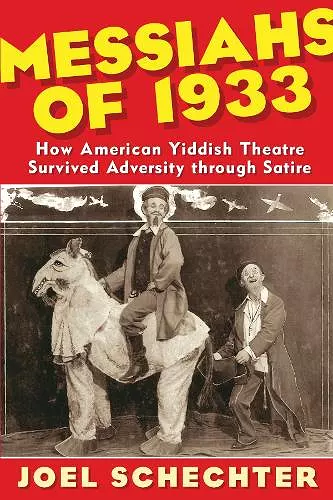Messiahs of 1933
How American Yiddish Theatre Survived Adversity through Satire
Format:Hardback
Publisher:Temple University Press,U.S.
Published:15th May '08
Currently unavailable, and unfortunately no date known when it will be back

Examines the stage performances created by the Artef collective, the Modicut puppeteers, and the Yiddish Unit of the Federal Theatre Project. This title introduces to contemporary readers some of the popular theatre actors of the 30s, including Leo Fuchs, Menasha Skulnik, and Yetta Zwerling.A lively examination of the vitality and imagination of Yiddish Theatre during the Great Depression
"One of the most interesting, lively and informative books that I have ever had the pleasure to read on subjects of Jewish-American culture and its connections with American popular culture." Paul Buhle, Brown University "A stylish, wry, and in-depth study of its subject. A very well-balanced blend of summary, excerpt, commentary, and reportage about critical responses of the day." Lawrence Bush, Editor, Jewish Currents "Schechter's passion for these long-forgotten works of Yiddish radicalism is contagious. Readers will be inspired to find out more about the rich tradition of Yiddish leftist theatre." The Jewish Daily Forward "[Schechter] has a wonderfully intuitive feeling for the material that only someone who has directed Yiddish plays (albeit in English) is likely to possess... [N]o review can do justice to Schechter's analysis of the plays and their meaning, but suffice it to say, a close reading of his book will prove delightful." Towards Freedom "Schechter tells the whole story of [Moise] Nadir and Artef (Arbeter Teater Farband, the collective of the workers' theater movement) with verve and elegance while never sacrificing scholarly standards... The book's photographs, cartoons, and illustrations are important references, and the bibliography is complete. This volume makes a significant contribution to the documentation of immigrant American culture. Summing Up: Highly recommended." Choice "Messiahs is well worth a perusal; the author writes with vigor and enthusiasm throughout, and his history is accompanied by witty comic strips, photographs and posters. Moreover, we can never have enough books about plays written in a tongue Isaac Bashevis Singer described as 'the wise and humble language of us all, the idiom of a frightened and hopeful humanity.'" -Moment Magazine, Nov/Dec 2008 "[Schechter] is at his best when describing individual plays and locating them in a social context...these [are] lively accounts." Association of Jewish Libraries Newsletter, February/March 2009 "It is rare that one reads an academic book telling a story that took place almost eighty years ago with a gasp of recognition at its relevance to contemporary experience... One of the book's undeniable strengths is its comparative nature. The author discusses parallels among Communist Yiddish theatres in the Soviet Union, England, and the United States, and he analyses the differences in the seemingly similar repertoires and even ideologies of Gosset, the Federal Theater Project, and Anglo-Jewish theatres... Schechter's study is the first of its kind to look carefully at the texts of the shund plays, now stored at the Rare Documents department of the Library of Congress. Looking at the content of these plays, he sees undeniable parallels with developments on Broadway and in Hollywood... I think that the main significance of the book is in its analysis of how an impoverished immigrant population used humour and satire in its mother tongue to cope with difficult economic circumstances in its new home. Time will tell whether the story told by Schechter repeats itself a hundred years later." Modern Drama, Fall 2009 "As a seasoned historian of politically subversive clowning and popular theatre, Schechter brings a unique perspective to Yiddish performance, filled as that story has been with tummlers, clowns, puppeteers, knockabout artists and other outrageous purveyors of sharply barbed satire. He succeeds in introducing readers to a side of Yiddish theatre they may not have been aware of." - Theatre Research International, July 2010
ISBN: 9781592138722
Dimensions: 229mm x 152mm x 25mm
Weight: unknown
304 pages